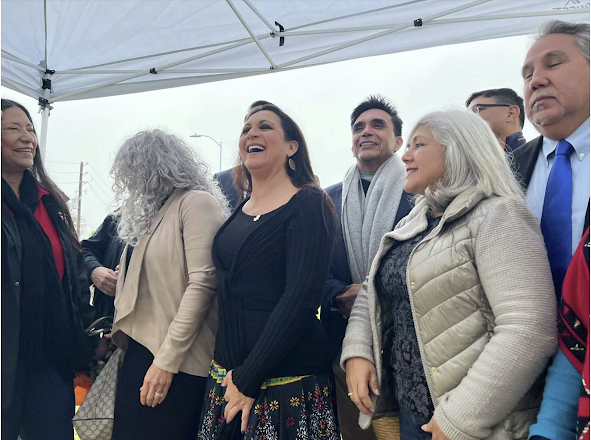"The bill passed with unanimous support out of the House Public Education Committee last session, and in a historic vote on May 11th, 2021, passed on third reading in the Texas House of Representatives. Texas State Representative Morales said, “Throughout my life, I have been empowered by knowing my family and community’s history. This bill would ensure that all Texans, regardless of their background, have the opportunity to learn their history. Tomorrow we will come together to once again bring renewed effort to making these courses available statewide.
Community organizer Tony Diaz, El Librotraficante, added, 'It is an honor to unite to support courses that are proven to increase graduation rates, academic achievement, and inspire students to profoundly examine the role of our communities in forming this state and this nation.'”
Love this quote by Rep. Morales: "The interest in these classes has only increased since they've been available as an elective, but I'm here to tell you that our history is not an elective." Full stop!
The 88th Texas Legislative session commences in January, 2023. It's about that time to reach out to whoever represents you to express your support for this legislation.
Folks should know that this bill is inclusive of Asian American Studies and Native American Studies. These elective courses are stuck in the Texas State Board of Education that has postponed their getting TEKS aligned for at least a year or more. Very disappointing. The good thing is that if this bill passes, it makes it to the top of the docket for approval and implementation by the Texas SBOE.
A final comment is that the Ethnic Studies movement has been a unifier, bringing so many of us, meaning new, diverse publics, into conversation with one another making this an exciting time for our increasingly diverse community in Texas such that it's all already worth it, worth pursuing.
-Angela Valenzuela
#EthnicStudiesNow
Texas bill on ethnic studies would add Mexican American, African American history to curriculum
Sam González Kelly, Staff writer | Nov. 15, 2022

State Rep. Christina Morales, center, laughs alongside Latino community advocates as she presents her ethnic studies bill Nov. 14, 2022, outside the historic LULAC Council 60 building at 3004 Bagby St. in Houston, Texas.
Citing strong student interest and the need for youth to understand their own history and culture, Texas Democratic lawmakers Monday reintroduced a bill that would require public schools to offer ethnic studies.
House Bill 45 is one of several education-based bills introduced Monday, the first day state lawmakers could file legislation for the upcoming 88th session of the Legislature, which convenes in January. The measure aims to add ethnic studies, specifically Mexican American and African American history, to a high school social studies curriculum that already requires that students study Texas and U.S. history. While the Texas State Board of Education has already created some ethnic studies courses, they do not count toward the state's high school graduation requirements and are not universally offered across Texas.
"The interest in these classes has only increased since they've been available as an elective, but I'm here to tell you that our history is not an elective," said the bill's lead author, state Rep. Christina Morales, flanked by other Democratic officials and Latino community advocates in front of the historic LULAC Council 60 building in Midtown.
"We need to ensure that all students in our Texas public high schools learn about their own history so that they can succeed, because that's for a better Texas," Morales said.
The bill would allow ethnic studies classes to count as half-credits toward the three required social studies credits necessary to graduate from high school. An identical measure was introduced during the 87th legislative session last year, and it passed the House by a vote of 81 to 59 before stalling in the Senate.
It will likely come up against opposition again from Texas Republicans, who last year banned from public schools the teaching of critical race theory, an advanced academic framework that explores the influence of race in politics and society, arguing that it pits children against each other and makes white children in particular feel guilty for historical events beyond their control.
CRT BILL: Legislature passes bill banning ‘critical race theory’ from Texas classrooms
Opponents of that ban say teaching America's history of slavery and segregation does not amount to critical race theory and that banning such subjects conveniently glosses over the country's history of racism and discrimination. In Texas, where people of color drove 95 percent of the state's population growth between 2010 and 2020, any history that doesn't include ethnic studies is incomplete, advocates of the newly proposed bill said.
"We all helped build this country, and it's time that our own children, that our communities, are able to learn about it and respect themselves and love themselves and recognize that their forefathers had a part in building this great country," said Rep. Gene Wu, a joint author of the bill introduced in 2021.
Though the 2021 bill's lone Republican joint author, former Rep. Dan Huberty, did not run for reelection after the 87th session, Morales said its success in the House last session is evidence she can muster bipartisan support in a Republican-led Legislature. The new bill does not yet have a GOP representative signed on.
"My challenge the first day that I get there into session is to align myself with one of the Republicans ... to help me pass this bill," Morales said. "Everybody is an immigrant, everybody has a different ethnicity. This is a very diverse state and very diverse city, and this will help many, many students all over our state."
No comments:
Post a Comment